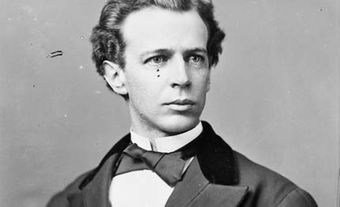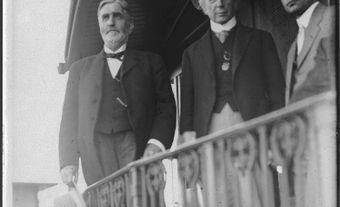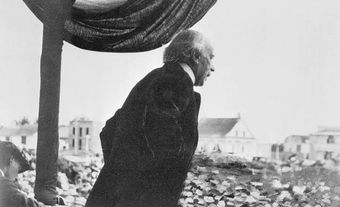
Address in Reply to the Speech from the Throne: Legislative Assembly of the Province of Québec 10 November 1871
The Honourable Members, who have proposed the address, have drawn a most attractive picture of the situation of the country. They have vied with each other in efforts to dazzle us with what they have been pleased to pompously term our wealth, prosperity and happiness. If they are to be believed, Canada is a real land of Cocayne, where everything is lovely and there is nothing left for us to do but to return thanks to Providence and to the Ministry.
But does this picture really portray the truth? I, for one, cannot accept it in that light. All who have studied the situation of the country otherwise than on paper and in the seclusion of their own homes, who have had the opportunity of a nearer view of our backward system of agriculture, our timid and vacillating trade and our blighted industry, know full well that the brilliant image evoked by the hon. Members, who proposed the address, is not the reality, but a deceptive mirage.
"Certainly, the fact is one of which we can be justly proud, that so many different races and so many opposite creeds should find themselves concentrated on this little corner of earth and that our constitution should prove broad enough to leave them all plenty of elbow room, without friction or danger of collision and with the fullest latitude to each to speak its own tongue, practise its own religion, retain its own customs and enjoy its equal share of liberty and of the light of the sun."
If the purely political and social aspect of the situation were the only question, I would accept without reserve all that has been said by the Honourable Members. Undoubtedly, our situation, viewed from the merely political and social standpoint, is excellent, thanks to the fundamental principle of our constitution the principle of free and representative government. It is due to this principle that the diverse elements, which compose our population, have been enabled to unite and form a compact and homogeneous whole, yet leaving to each its character and its autonomy. Certainly, the fact is one of which we can be justly proud, that so many different races and so many opposite creeds should find themselves concentrated on this little corner of earth and that our constitution should prove broad enough to leave them all plenty of elbow room, without friction or danger of collision and with the fullest latitude to each to speak its own tongue, practise its own religion, retain its own customs and enjoy its equal share of liberty and of the light of the sun. I myself have the honour to represent a county in which are grouped all shades of race and creed and am happy to be able to bear testimony publicly to this state of things.
But there is another side to the situation; there is the economic side and I do not hesitate to say that it seems to me dark, very dark, indeed.
We have been told that we are rich and prosperous. But is this the case? Question all classes of society, the merchant, the banker, the shop-keeper, the member of the liberal professions, the farmer, the simple mechanic, and among all, without exception, you will find the same story of hard times, of uneasiness, of suffering and languor, denoting that there is something wrong somewhere.
It might be almost said that this country is placed under an immense pneumatic machine and that it is writhing and struggling in vain to get to its lungs a few particles of an air which is becoming more and more rarefied. This is the truth! This is the true situation! He is blind who does not see it, and he is guilty, who, in seeing, does not admit it.
Still, it is being constantly dinned into our ears that we have mines, timber, resources of all kinds that we are rich, in fact. Sir, there are riches and riches.
Tantalus was rich. He had always an abundantly, a sumptuously served table spread before him; but the trouble was that, in sight of all this abundance, he was eternally starving.
Our position very much resembles that of Tantalus. An infernal hand seems to be always withdrawing our riches whenever we strive to grasp them. The man, who found a bag of gold dust in the desert, considered himself rich. But shortly afterwards, when he was dying of hunger over his treasure, he no doubt exclaimed in bitterness of spirit that a simple piece of bread would have been preferable, as it would have saved him.
We also are expiring over our treasures and year after year the flood of those who are leaving our riches and going to the United States to seek the morsel of bread that will save them goes on steadily increasing.
Once more, I say, this is the real situation. God forbid that I should hold the Ministry alone responsible for it! Its causes are multiple and all of them are not under its control. But what I blame the Ministry for is not seeing the situation or, if they see it, for not having the courage to face it.
I was disappointed yesterday on hearing the Speech from the Throne. His Excellency had done us the honour to summon us for the despatch of business; we come, we listen with respectful attention, and we find that the only business which His Excellency invites us to despatch is what, to congratulate the Government on the happy labours of the last Parliament; and that’s all. Not one measure proposed; not one reform suggested.
Yes, I repeat, I was grievously disappointed: I had expected that the Ministry had studied the situation and that it would indicate both the source of the ill and the remedy.
The principal source of the evil from which we suffer is that thus far the production of this country is not equal to the consumption. The Ministry might all the more easily have admitted this, seeing that it does not alone bear the responsibility which weighs upon the entire nation. It is a humiliating confession to make that, after three centuries of existence, this country is still unable to supply its own wants and that it is still obliged to have recourse to foreign markets, though nature has lavished upon it all the gifts necessary to render it a manufacturing country.
It is now, Sir, a good many years since the great Patriot, whom we recently lost, Honourable L.J. Papineau, casting about for a remedy for the ills of the time, summed up his policy on the subject in this simple precept: “We should buy nothing from the metropolis.” My opinion is that this policy is even more urgent today than it was when first formulated.
It is a duty, especially for us Canadians of French origin, to create a national industry. We are surrounded by a strong and vigorous race who are endowed with a devouring activity and have taken possession of the entire universe as their field of labour.
As a French Canadian, Sir, I am pained to see my people eternally excelled by our fellow countrymen of British origin. We must frankly acknowledge that down to the present we have been left behind in the race. We can admit this and admit it without shame, because the fact is explained by purely political reasons which denote no inferiority on our part.
After the conquest, the Canadians, desirous of maintaining their national inheritance intact, fell back upon themselves, and kept up no relations with the outside world. The immediate result of this policy was to keep them strangers to the reforms which were constantly taking place beyond their boundaries and to fatally shut them up within the narrow circle of their own old theories. On the other hand, the new blood, which was poured into the colony, came from the most advanced country under the sun in point of trade and industry. They brought with them the civilization of their native land and their strength was ceaselessly renewed by a constant current of immigration, which added not only to their numbers, but to their stock of information and their ideas.
We need therefore have no shame in admitting that we were beaten by such men and under such circumstances. But the times have changed and the hour has struck to enter the lists with them. Our respective forefathers were enemies and waged bloody war against each other for centuries. But we, their descendants, united under the same flag, fight no other fights but those of a generous emulation to excel each other in trade and industry, in the sciences and the arts of peace.
I have already stated that the Government of the Province of Quebec is not alone responsible for the stagnation of our industry. It is sufficient to say that alone it can neither create nor develop it, but it can contribute powerfully thereto by the kind of immigration which it introduces into the country. Thus far it seems to me that the Government has been moving in the wrong direction. The Government has devoted itself to recruiting an exclusively agricultural immigration and its efforts will end in nothing. The agricultural population of this country will never be increased from outside. Our climate is too severe and the development of our lands too costly and difficult.
The children of the soil will not be deterred by these obstacles; but the stranger will simply pass through our territory and locate on the rich prairies of the west. Moreover, wherever our agents set their foot, they find themselves forestalled by American agents, by American books and pamphlets, and, above all, by American prestige.
We can, however, introduce here with good results, I think, an industrial immigration. I do not mean simple workmen, but master mechanics and small capitalists such as are to be found in all the cities of Europe. The inducement, which would lead them to invest their labour and their capital in our midst is that we can produce twenty-five per cent cheaper than any other part of the American continent what we need is the master-miners of Wales and the north of England, the mechanics of Alsace, the Flemish weavers and the German artisans of all kinds. Such an immigration, it seems to me, would give an extraordinary impulse to our industry.
In addition to this purely economic question, there are political reforms which we hoped to have seen announced in the Speech from the Throne. Among these reforms, there are two, which have been urgently demanded by public opinion for a long time past, in our election law and in education.
Our election law is deplorably behind that of the other provinces and even of the Dominion. Public opinion has long demanded a law modelled on that of Ontario, where the elections are all held on the same day. Our law has opened the door to lamentable abuses and to the direct intervention of the Government in the exercise of the popular suffrage. At the last elections, the Government was thus enabled to first issue the writs for such of the counties as it considered safe, and afterwards, thanks to this tactic, to bring all its strength to the assistance of its friends whom it deemed in danger. Such conduct is an abuse. If we are a free people, the popular suffrage must be freely exercised and the exact expression of the popular will must be secured.
I shall only refer incidentally to the question of education upon which we have been long and are still waiting for the Premier’s action. When the Honourable Premier assumed the reins of power in 1867, he had been for twelve years Superintendent of Education and had just returned from a trip to Europe undertaken for the express purpose of studying on the spot the different educational systems of the Old World. It was our hope that, on his return, he would have embodied in legislation the results of his observations and experience. But for the last four years, like Sister Anne on the tower top, we’ve have been looking for something to come, but it has not yet appeared.
I have heard it said elsewhere: “But what is the good of these reforms? Will they increase the public wealth? Will they enhance in the slightest degree the prosperity of the country?” Sir, in a free state, everything is connected and linked together legislation, trade, industry, art, sciences and letters, all are members of a same body, the body social.
When one of the Members suffers, the entire body is affected; when there is an abuse anywhere, the entire body social is more or less paralyzed; when there is anywhere something left undone which should be done, the normal order is thereby disturbed.
England has become great because she has thoroughly understood this principle. No question there has ever been allowed to languish. No sooner has an abuse been noted and a reform demanded, than the Government of the day, whatever it might be, Whig or Tory, has at once given the subject attention and taken the initiative, never dropping it until the abuse has been destroyed and the reform accomplished.
We, on the contrary, only know how to pander to our own prejudices and our self-love; we never have the courage to admit that we are not perfect or that there is anything we should do.
I grant, Sir, that, underlying this conduct, there may be a thought or rather an excess of patriotic affection. But this is far from being a proper patriotism and it is certainly not mine. My patriotism consists rather in telling my country hard truths, which will help to arouse it from its lethargy and to direct it at last into the path of true progress and true prosperity.
(See also Sunny Ways: The Speeches of Sir Wilfrid Laurier.)

 Share on Facebook
Share on Facebook Share on X
Share on X Share by Email
Share by Email Share on Google Classroom
Share on Google Classroom


